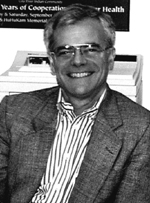
Michael Gottesman
THESE DISCUSSIONS
[BETWEEN MENTOR AND
FELLOW] SHOULD BE
FRANK AND FAIR, OR
THEY WILL BE OF LITTLE
VALUE. IF NECESSARY,
DISCUSSIONS CAN BE
INITIATED BY THE
FELLOW; BUT, IN ANY
CASE, THEY SHOULD
OCCUR. WHERE IT IS
HELPFUL, MEETING
DETAILS COULD BE PUT
IN WRITING.
Postdocs are critical to NIH. They have a hand in most NIH intramural researchand are our largest group of trainees. And critical to postdocs is mentoring. A previous column on the expectations that a postdoc should have about training at NIH led to the "Guide to Mentoring and Training in the Intramural Program." This booklet, which I hope you have all read carefully, provides an outline of the responsibilities of both mentor and trainee at NIH. This column targets what I consider to be the most basic first step in mentoring: Whether you are a supervisor or mentor—or both—I encourage you early on, to approach your fellows and begin a dialogue that opens with a simple invitation:
"Let’s talk."
Starting shortly after a postdoc arrives at a lab, and then continuing on a regular basis, the point of discussions between mentor and fellow should be to set goals and assess progress toward them, provide a framework for the training experience at NIH, clarify expectations on both sides, and provide career advice for the fellow.
These discussions should be frank and fair, or they will be of little value. If necessary, discussions can be initiated by the fellow; but, in any case, they should occur. Where it is helpful, meeting details could be put in writing.
When a fellow enters a lab, his or her supervisor should spend some time discussing the research project or projects currently underway in the lab; the role of the fellow in each project; expectations about independence, authorship (including the likelihood of there being publishable work from a project), and collaborations; any prior agreements that could affect the fellow’s work; and any rules that govern conduct in the lab.
A first meeting is also a time to provide and discuss the "Guidelines for the Conduct of Science in the NIH Intramural Program" and the "Guide to Mentoring and Training." There should be explicit mention of the duration of the appointment, the experience of previous fellows in finding jobs, and what the expectations of fellow and mentor are with respect to careers in biomedical research. In a recent survey conducted by the NIH Fellows’ Committee, about one-quarter of the fellows who responded were unable to identify their mentors. (See The NIH Catalyst, March–April 1999.) The first meeting is an excellent time for the supervisor to offer to be a mentor and to suggest other scientists who could also offer useful advice to the fellow.
Beyond this first talk, there should be regular meetings to discuss science, conduct of science, and career-related issues. Data sessions should be held frequently—perhaps weekly—especially early in the training of a postdoc. The same Fellows’ survey suggested that about 20 percent of the fellows who responded meet less than once a month with their supervisors.
There should also be an annual meeting specifically to evaluate the work of the fellow and indicate whether he or she is on track to achieve research and career goals. This is an important opportunity to begin a discussion about jobs after the postdoctoral experience, to indicate that some goals are impractical, and to help a fellow choose a reasonable course of action.
In the year before a fellow leaves, more specific career planning has to take place. Is another postdoc a reasonable option? To what jobs should a fellow apply? What scientific work can be taken from the lab and what should stay? It is very helpful to fellows to have someone critique their cover letters, their CVs, and their applications to specific jobs. Will the mentor be willing to make some telephone calls on behalf of the fellow?
Finally, the fellow should have an exit interview with the mentor to outline what went well, what could use improvement, and what should be avoided in the future. These kinds of discussion are difficult, but very important if we want to fulfill our duties as mentors and improve the postdoctoral experience at NIH.
Deputy Director for Intramural Research